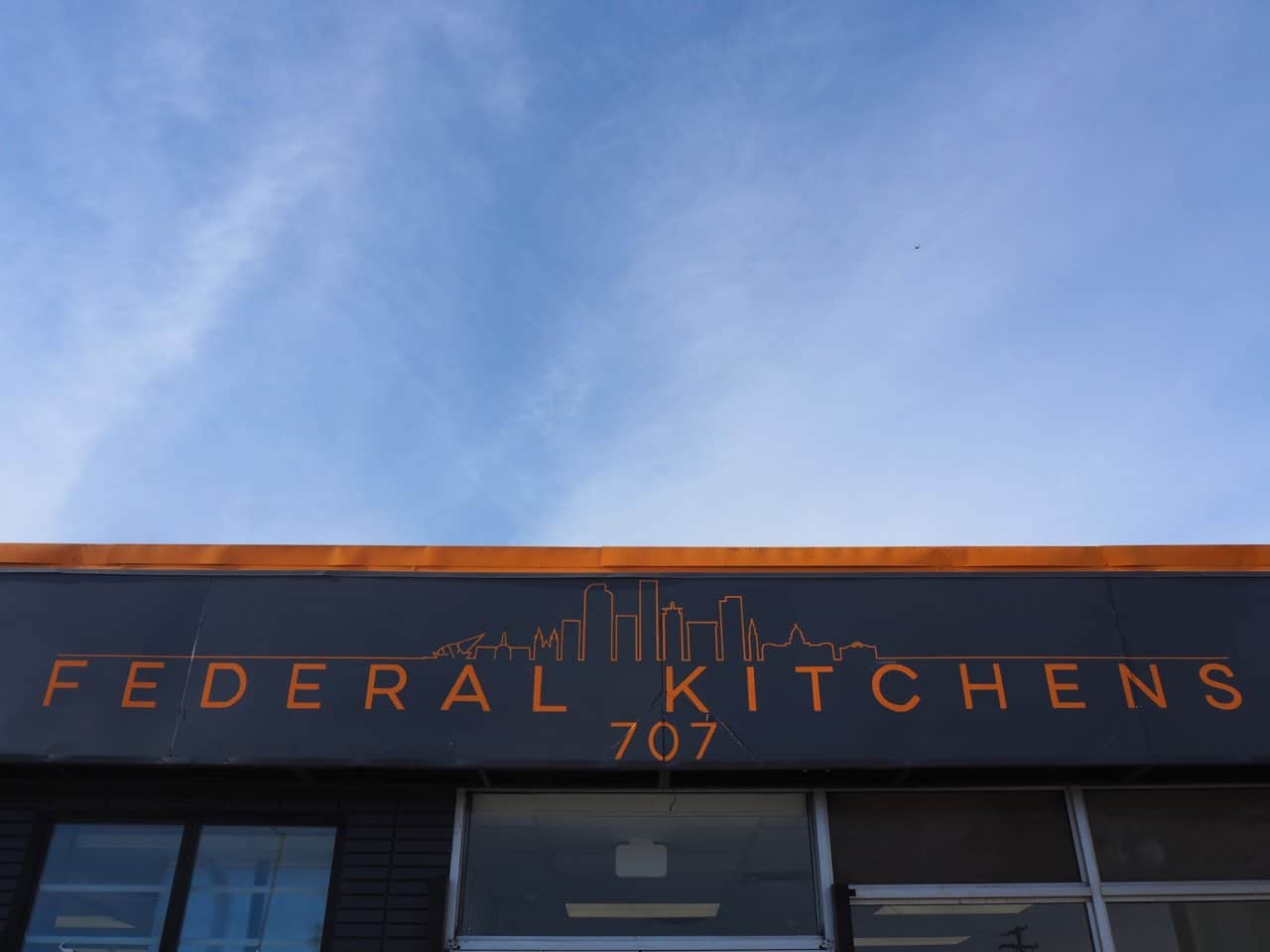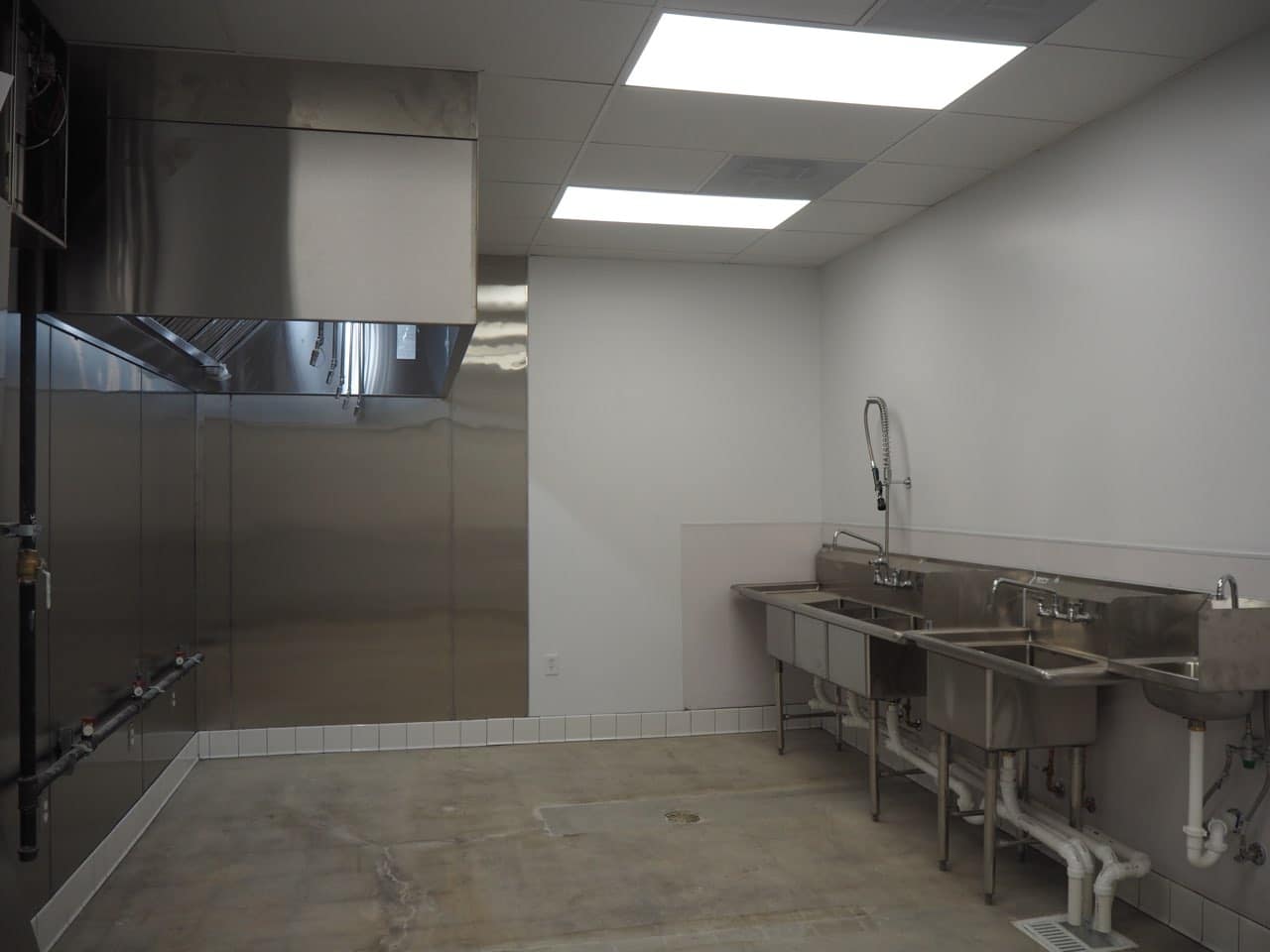
Maker Kitchens is opening its first Denver location at 707 Federal Blvd. (Matt Geiger/BusinessDen)
Bennett Goldberg lives by a simple three-word motto: “Follow the cranes.”
The 47-year-old is a partner at Maker Kitchens, a ghost and commissary kitchen concept first started in Los Angeles almost a decade ago. Now, the company is expanding to Denver, serving up locations in Park Hill and along Federal Boulevard.
“First and foremost, we’re a real estate company … We won’t buy anything that’s not in the path of development, ” Goldberg said.
Both locations are in grittier, more industrial areas with the hope they will become destinations in the coming decades. First, there’s the space at 707 Federal Blvd. The company bought the roughly 10,000-square-foot building, previously home to an appliance repair business, for $1.8 million.
“If you stand at our location at Federal and do a 360, you see a ton of cranes,” Goldberg said.
He hopes to have the space open by the end of January, and expects the property to be 100 percent leased by then.

Maker Kitchens partners Bennett Goldberg, left, stands with Patrick Ross, the company’s director of finance. (Courtesy Maker Kitchens)
The building is equipped with 22 kitchens, ranging from 230 to 400 square feet. Each unit has a hood and three sinks. Goldberg’s firm handles water, sewer, WiFi, hood cleaning, grease traps and parking.
“(It’s) basically turnkey once you plug your oven in,” Goldberg said.
Other ghost kitchen providers charge service fees and often take a cut of their tenants’ revenue, Goldberg said. The only bill tenants at Maker Kitchens have to pay is rent, which ranges from $2,700 to $3,500 a month.
The tradeoff, however, is the minimalistic nature of the business. No onsite management is present, as Goldberg prefers to take a more “hands-off approach.” Any more than 25 or so kitchens and the model begins to fall apart, he added.
However, Maker Kitchens’ tenants are not all traditional ghost kitchen operators, like fast food and takeout joints.
“Anything that you find at Sprouts or Whole Foods. All these locally made potato chips, hot sauce, granola, anything like that you can imagine are made in ghost kitchens, and that’s a huge part of the clientele,” Goldberg said.
“We can probably lease this whole thing up with granola companies.”
It costs about $6 million, including the price of the building, for a complete buildout of the space. Goldberg’s background is in real estate, most recently in the office space. He said the margins in this line of business are much better.
It essentially costs the same to build out a Maker Kitchens concept as it would to do that in an office setting, he said. But offices lease for $3 a square foot, while a ghost kitchen rents at $12 a square foot.
“I’m never doing office again,” Goldberg said.
Also, the cost to outfit his kitchen spaces are roughly the same across his many markets. Though the business was first started in Southern California, it has since expanded to places such ase Columbus, Ohio and Phoenix, Arizona.
“All the steel, all the concrete, all the wood, all the equipment – all comes from the same place. It’s going to cost us $150,000 a kitchen in hard and soft costs no matter where we are,” Goldberg said.

Makers Kitchen units are outfitted with a hood and three sinks. (Matt Geiger/BusinessDen)
Besides the outlier in Ohio, the group’s real expansion focus is all about proximity to Los Angeles. Goldberg said he looked at Portland, Oregon and Seattle, Washington before deciding on Denver, but settled here because “real estate was out of control, way too expensive” in other cities.
“Denver was just a logical choice,” Goldberg said, adding Boulder could be a natural fit as well.
Ghost kitchens gained a profile during the pandemic, when consumers flocked to meal-delivery services and few people were dining in. A major player in the space is CloudKitchens, controlled by Uber co-founder Travis Kalanick. CloudKitchens’ head of global real estate, Barak Diskin, went to high school with Aaron Aftergood, another partner at Maker Kitchens, Goldberg said.
Goldberg said that Maker Kitchens actually had a permit for a ghost kitchen before CloudKitchens back in 2014. Aftergood had seen his uncle lease some kitchens to tenants in the Bay Area in 2012 and wanted to replicate the concept on a larger scale.
Covid hit, and “that jump-started the whole thing,” Goldberg said.
Since the pandemic, nine locations have been added to Maker Kitchens’ burgeoning enterprise.
“The company that buys our portfolio may not even exist yet,” Goldberg said. “He hasn’t dropped out of Harvard yet.”
Goldberg added that he expects to stick with just two locations in Denver proper, with the other in Park Hill at 5155 E. 39th Ave. expected to open by March.
Both of the transactions were brokered by Joey Gargotto of NAI Shames Makovsky on behalf of Maker Kitchens. Gargotto worked with Todd Synder, who is now with Kentwood Commercial Real Estate.
“Maker Kitchens was looking for residential density, ease of access, and a customer base that was comfortable with delivery apps,” Gargotto said in an email. “That pulled us to neighborhoods on the perimeter of the urban core, like LoHi and RiNo. Once we found 707 Federal, we looked at rush hour drive-time maps to focus the search for a second location.”

Maker Kitchens is opening its first Denver location at 707 Federal Blvd. (Matt Geiger/BusinessDen)
Bennett Goldberg lives by a simple three-word motto: “Follow the cranes.”
The 47-year-old is a partner at Maker Kitchens, a ghost and commissary kitchen concept first started in Los Angeles almost a decade ago. Now, the company is expanding to Denver, serving up locations in Park Hill and along Federal Boulevard.
“First and foremost, we’re a real estate company … We won’t buy anything that’s not in the path of development, ” Goldberg said.
Both locations are in grittier, more industrial areas with the hope they will become destinations in the coming decades. First, there’s the space at 707 Federal Blvd. The company bought the roughly 10,000-square-foot building, previously home to an appliance repair business, for $1.8 million.
“If you stand at our location at Federal and do a 360, you see a ton of cranes,” Goldberg said.
He hopes to have the space open by the end of January, and expects the property to be 100 percent leased by then.

Maker Kitchens partners Bennett Goldberg, left, stands with Patrick Ross, the company’s director of finance. (Courtesy Maker Kitchens)
The building is equipped with 22 kitchens, ranging from 230 to 400 square feet. Each unit has a hood and three sinks. Goldberg’s firm handles water, sewer, WiFi, hood cleaning, grease traps and parking.
“(It’s) basically turnkey once you plug your oven in,” Goldberg said.
Other ghost kitchen providers charge service fees and often take a cut of their tenants’ revenue, Goldberg said. The only bill tenants at Maker Kitchens have to pay is rent, which ranges from $2,700 to $3,500 a month.
The tradeoff, however, is the minimalistic nature of the business. No onsite management is present, as Goldberg prefers to take a more “hands-off approach.” Any more than 25 or so kitchens and the model begins to fall apart, he added.
However, Maker Kitchens’ tenants are not all traditional ghost kitchen operators, like fast food and takeout joints.
“Anything that you find at Sprouts or Whole Foods. All these locally made potato chips, hot sauce, granola, anything like that you can imagine are made in ghost kitchens, and that’s a huge part of the clientele,” Goldberg said.
“We can probably lease this whole thing up with granola companies.”
It costs about $6 million, including the price of the building, for a complete buildout of the space. Goldberg’s background is in real estate, most recently in the office space. He said the margins in this line of business are much better.
It essentially costs the same to build out a Maker Kitchens concept as it would to do that in an office setting, he said. But offices lease for $3 a square foot, while a ghost kitchen rents at $12 a square foot.
“I’m never doing office again,” Goldberg said.
Also, the cost to outfit his kitchen spaces are roughly the same across his many markets. Though the business was first started in Southern California, it has since expanded to places such ase Columbus, Ohio and Phoenix, Arizona.
“All the steel, all the concrete, all the wood, all the equipment – all comes from the same place. It’s going to cost us $150,000 a kitchen in hard and soft costs no matter where we are,” Goldberg said.

Makers Kitchen units are outfitted with a hood and three sinks. (Matt Geiger/BusinessDen)
Besides the outlier in Ohio, the group’s real expansion focus is all about proximity to Los Angeles. Goldberg said he looked at Portland, Oregon and Seattle, Washington before deciding on Denver, but settled here because “real estate was out of control, way too expensive” in other cities.
“Denver was just a logical choice,” Goldberg said, adding Boulder could be a natural fit as well.
Ghost kitchens gained a profile during the pandemic, when consumers flocked to meal-delivery services and few people were dining in. A major player in the space is CloudKitchens, controlled by Uber co-founder Travis Kalanick. CloudKitchens’ head of global real estate, Barak Diskin, went to high school with Aaron Aftergood, another partner at Maker Kitchens, Goldberg said.
Goldberg said that Maker Kitchens actually had a permit for a ghost kitchen before CloudKitchens back in 2014. Aftergood had seen his uncle lease some kitchens to tenants in the Bay Area in 2012 and wanted to replicate the concept on a larger scale.
Covid hit, and “that jump-started the whole thing,” Goldberg said.
Since the pandemic, nine locations have been added to Maker Kitchens’ burgeoning enterprise.
“The company that buys our portfolio may not even exist yet,” Goldberg said. “He hasn’t dropped out of Harvard yet.”
Goldberg added that he expects to stick with just two locations in Denver proper, with the other in Park Hill at 5155 E. 39th Ave. expected to open by March.
Both of the transactions were brokered by Joey Gargotto of NAI Shames Makovsky on behalf of Maker Kitchens. Gargotto worked with Todd Synder, who is now with Kentwood Commercial Real Estate.
“Maker Kitchens was looking for residential density, ease of access, and a customer base that was comfortable with delivery apps,” Gargotto said in an email. “That pulled us to neighborhoods on the perimeter of the urban core, like LoHi and RiNo. Once we found 707 Federal, we looked at rush hour drive-time maps to focus the search for a second location.”
